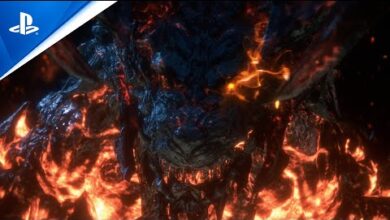
In Ghostwire: Tokyo, you awake amidst the mass disappearance of nearly all of Tokyo’s population, paving the way for otherworldly Visitors to take over the city. Resembling real-life superstitions, folklore, yokai and urban legends, these Visitors won’t be stopped by conventional weapons alone. You’ll need to work alongside an unlikely ally – the spirit of a grizzled detective named KK – to have the powers and skills necessary to hunt down the perpetrators behind Tokyo’s vanishing and restore reality to the city.
In addition to gear like a powerful bow and arrow and mystic techniques like Ethereal Weaving, knowledge is also a useful tool for solving the paranormal threat enveloping Tokyo. Here are just a few examples of the beings – both hostile and potentially friendly – you’ll encounter in the haunted streets of Tokyo, as well as a little intel to aid you in your ghost hunting adventure.
Kuchisake
Based on the urban legend of the kuchisake-onna , AKA “Slit-Mouthed Woman,” Ghostwire’s Kuchisake is a vicious Visitor in the form of a masked woman wielding a massive pair of scissors. In the original folklore, the kuchisake-onna asks its victims if they think she is beautiful, only to reveal her disfigured grin. She then repeats the question, often maiming the victim with similar scars if they disingenuously maintain that she’s pretty or killing them outright if they say the opposite.
“At least some part of including the kuchisake-onna came down to how ubiquitous the concept is in Japan as an urban legend,” explains Game Director Kenji Kimura. “That said, what ultimately led to the inclusion was the fact that they don’t look like monsters at first glance, just regular women wearing coats. As such, they complemented one of our goals for the game: to portray the unsettling and extraordinary within entirely ordinary settings. As they get closer to the player, you’ll be able to hear them clacking and snipping while they open and close them. It makes for an extra-immersive aural sensation when experienced through the PlayStation 5’s 3D audio capabilities.”
A clever misdirection can help prevent you becoming the kuchisake-onna’s prey and besting Ghostwire’s version requires a similar approach. When she closes in, use your Ethereal Weaving to summon a blocking barrier at just the right time to parry her attacks but beware, even deadlier foes lurk along Tokyo’s alleyways. “Ghostwire: Tokyo also features another variety of kuchisake-onna in red clothing. That version is inspired by a different urban legend involving a woman in red,” explains Kimura. “In that sense, the kuchisake-onna in Ghostwire aren’t just pulled directly from legends and folklore, but more like a combination and reimagining of the concepts.”
Tengu
While Visitors like the bloodthirsty Kuchisake pose a serious threat to the under-prepared, not every supernatural being in Tokyo is an enemy. Some, like the wandering tengu floating around the city’s skyline, can serve as crucial assets in your mission.
Look near the top of buildings (or tap into your Spectral Vision ability) to locate these airborne yokai and use your Grapple ability to hoist yourself up onto Tokyo’s rooftops! On top of unlocking whole new areas to explore, the city’s skyline offers ample vantage points to get the drop on foes as well as chances for a breathtaking snapshot in Ghostwire’s Photo Mode.
“The main priority for the yokai designs in Ghostwire: Tokyo was to ensure they would all be unique and easily distinguishable,” says Lead Character Artist Yoshifumi Hattori. “In the tengu’s case, that meant having them wear clothing similar to yamabushi, a sort of spiritual hermit that lives in the mountains. We opted to make them into bird tengu specifically because we felt that something more bestial would fit in well with the cityscape. Tokyo is full of crows, after all.”
“There are many different stories of tengu depending on the region and time period,” adds Kimura. “The ones that caught our attention were those that depicted people being whisked from one place to another in the blink of an eye by tengu, as well as the creatures whipping up strong winds to lift objects into the air. These things made us think it would be fun to have them transport players to high places in the game.”
Tanuki
As mischievous as they are often adorable, tanukis are a famous staple of traditional Japanese folklore. Often depicted as tricksters, these mythical raccoon dogs have been known to possess shapeshifting powers. “We gave them a distinctive way of speaking by having them use the regional dialect prevalent in the part of Japan famous for tanuki legends,” says Kimura. “Beyond that, each of the creatures is characterized by varied clothing, accessories and headwear.”
As you roam Tokyo, you’ll discover a group of these lil’ guys have gotten themselves lost in the streets. Wrangling them up may net you a nice reward, but it will also require some keen eyes – tanukis are masters of disguise, after all. See a sign or a bowl of ramen that’s just a bit out of place? It could be a tanuki!
Shine Dancer
Shine Dancers get their name and appearance from teru teru bōzu – traditional paper dolls commonly crafted as adorable charms wishing for good weather. However, the airborne Visitors taking to Tokyo’s skies are less a lucky omen and more a threat capable of ambushing from the air (or even hiding as a harmless piece of fabric, so keep your eyes peeled.)
“For Ghostwire: Tokyo, it was important to us that we portray the unsettling and extraordinary within entirely ordinary settings,” says Kimura. “To achieve that vision, we went out of our way to incorporate things that look like ordinary people on the outside or otherwise appear to be harmless but can take on an eerie edge based on interpretation.”
“The teru-teru bōzu charms are one such example of this. In Japan, these are objects that are hung under the eaves of buildings in order to ward off rain and invite good fortune. However, viewed another way, they look like dolls being hung by their necks. It’s a fascinating juxtaposition, which is what makes the Shine Dancers one of my favorite Visitors.”
Kappa
Like their counterparts in Japanese folklore, kappas in Ghostwire are amphibious yokai found near water. They possess useful Magatama that can unlock your potential to learn greater skills but are also slippery little creatures to catch. “Kappa weren’t all that difficult to incorporate into [Ghostwire: Tokyo],” Kimura says. “If you look at Tokyo’s cityscape, you’ll actually find a surprising number of rivers and ponds, as well as fountains located in commercial facilities. These sorts of water sources are familiar sights to anyone living in the city.”
“The kappa in our game are the [variety] people readily picture in their minds, including their usual head platter and shell,” Hattori adds. “When it came to the finer details and whatnot, we added elements that are more typically seen in creature designs made outside of Japan.”
Thankfully, like the myths they are based on, kappas in Ghostwire can’t resist their favorite snack as bait. Those familiar with the kappa’s folklore already know what food we’re talking about, but here’s a hint: it’s a green vegetable renowned for staying cool. As for where you can get one, you may have some luck at a nearby shop or kiosk…
Nekomata
Speaking of shops, convenience stores and other kiosks around town may be operated by a new breed of shopkeeper: a nekomata yokai resembling a two-tailed cat.
“The original idea was to make shops places that players could wander into when they needed a breather exploring the city and battling Visitors. We thought it would be nice if the shops could have something in them that was calming for the player, and that’s how we came to having nekomata run the shops,” says Kimura.
Ghostwire’s nekomata are happy to offer the player provisions, ammunition and other supplies…for a fee, of course. You’ll need to acquire a special currency called Meika from completing quests to afford their wares. From time to time, you may be tasked with acquiring some special items for the nekomata as well. We suggest doing these favors for Ghostwire’s feline friends – they may not believe in a free lunch but they do know how to reward a hard-working ghost hunter.
“There’s plenty of rewards to be had by helping them track down the items they need, but there’s also a relaxing element to the whole dynamic too,” says Kimura. “When you deliver items to them, the nekomata will actually wear them. These are things like lion masks, bottle gourds, hairpins, and more. We hope players notice just how cute they look when they wear these accessories.”
“Yokai aren’t harmful to humans as a rule. Even with one specific variety, you’ll find stories of them both attacking and helping humans,” Kimura goes on to explain. “If anything, they tend to take a more neutral position in regards to humanity. This is because, conceptually, yokai were originally intended to personify natural or otherwise inexplicable phenomena.”
“In other words, while you might not see them, they could always be nearby, going about their own business. You can contrast this to the sort of monsters you often find in urban legends. Many of them seem to be spawned from the negative emotions that people carry with them, their anxieties and so forth. I think that’s why, by comparison, you tend to hear more stories about them harming people. This is the thinking that informs Ghostwire: Tokyo – a game in which players acquire yokai powers and use them to fight the monsters of urban legend.”
Ghostwire: Tokyo launches March 25 on PlayStation 5 – pre-order today to receive the Premium Biker outfit pack and Hannya outfit items! Players with an active PlayStation® Plus membership may also receive 10% off pre-purchase of the digital version of the game at PlayStation Store. Other terms and conditions apply, offers may not be available in all regions.





